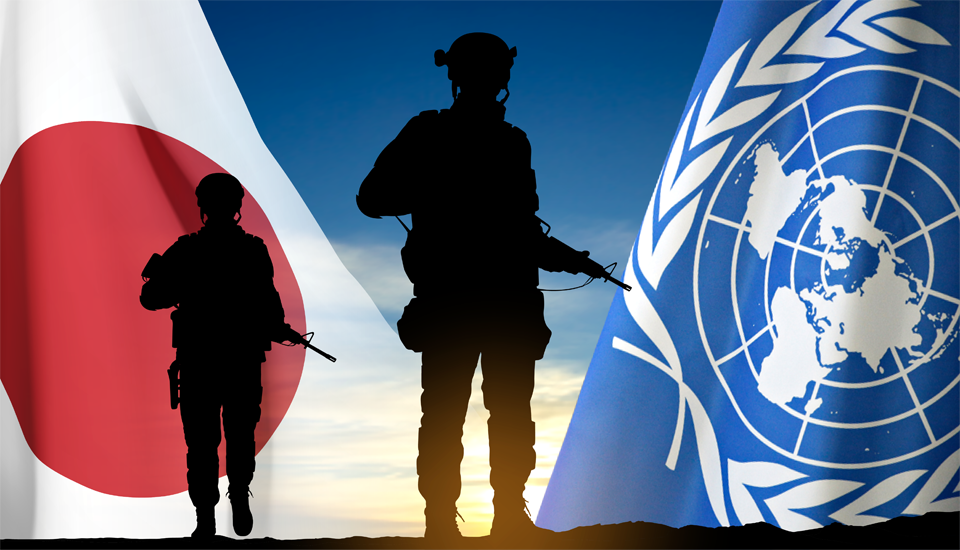
Japan’s Stance on North Korea’s “New Cold War” Narrative: Strengthening Japan’s Defense and Global Normative Power
Commentary | March 29, 2023
Seunghee Oh
Research Professor at Seoul National University Institute of Japanese Studies
Seunghee Oh, a research professor at Seoul National University Institute of Japanese Studies, suggests that Pyongyang perceives the current global order as a “new Cold War” and views strengthening trilateral cooperation among Seoul, Washington, and Tokyo as hostile to its national interest. In response to North Korea’s moves, Japan prioritizes multilateral initiatives to strengthen its security ties with other partners in the region and the globe. Dr. Oh further claims that as Tokyo assumes the presidency of the G7 Hiroshima Summit this year and has been elected as a non-permanent member of the 2023-24 UN Security Council, Japan is well-positioned to criticize North Korea as an international norm violator and proactively address the North Korean problem and utilize it to enhance its global leadership.
North Korea's Perceived Hostility towards Trilateral Cooperation
At the 6th Plenary Session of the 8th Central Committee of the Workers’ Party of Korea, Kim Jong Un acknowledged the current external environment as a ‘New Cold War’ and perceived the trilateral cooperation among South Korea, the US, and Japan as hostile. Consequently, North Korea argued that it must prioritize enhancing its nuclear and defense capabilities to ensure national security in the face of military blockades imposed by these countries.
Thus far in 2023, North Korea has conducted seven missile tests as of March 19, coinciding with the joint military exercises between the US and South Korea in springtime. Preceding the Freedom Shield exercises, North Korea issued a warning of the “toughest counteraction against the most vicious plots of the US and its followers.” [1]Furthermore, one missile launch coincided with the visit of South Korean President Yoon Suk Yeol to Japan for a summit aimed at enhancing bilateral relations with Japanese Prime Minister Kishida Fumio. Of particular concern is the fact that some of the missiles launched by North Korea have fallen within Japan’s exclusive economic zone(EEZ), thereby heightening anxieties over the threat posed by North Korean missiles. Against this backdrop, this article examines Japan's response to the security challenges presented by North Korea, taking into account Japan’s assessment of the North Korean threat.
Japan’s Perception of North Korea: Considering North Korea as a Matter of Concern
“The Japanese government has implemented various measures to achieve its fundamental objective of normalizing its relations with North Korea through the comprehensive resolution of several issues of concern.”[2] Since 2002, the Cabinet Office of Japan has been conducting a survey on foreign relations, but the inquiries regarding North Korea are distinct from those of other countries. Rather than inquiring about preferences or favorability, the government has focused on several “issues of concern.” These issues include Japanese abductions, nuclear and missile programs, as well as the normalization of diplomatic relations between Japan and North Korea. These four topics have been identified as the primary agenda items related to North Korea.
Figure 1. Issues of Concern of North Korea
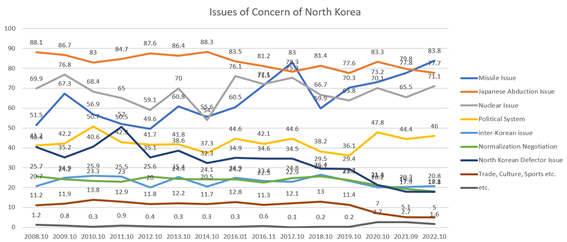
According to recent survey result, Japan views North Korea as a significant missile threat(Figure 1). Japan’s negative perception of North Korea is increasingly solidified, causing discussions on normalization of North Korea-Japan relations to become more distant. Moreover, Japan’s perception as a victim of North Korea’s illegal activities continues to intensify. The frequency of missile launches has led to training for the population to evacuate when the alarm goes off, further highlighting the perceived threat posed by North Korea.
North Korea's Security Threat: Strengthening Japan's Security and Multilateral Initiatives
“North Korea's military activities pose an even more grave and imminent threat to Japan’s national security than ever before. The repeated ballistic missile launches by North Korea pose serious challenges not only to Japan but also to the international community and are unequivocally unacceptable.”[3]In response, Japan has strongly protested through various multilateral initiatives, including the G7. Also, Japan appeals that it is imperative for the international community to collaborate in enforcing the UN Security Council resolutions that call for the complete, verifiable, and irreversible dismantlement of all weapons of mass destruction and ballistic missiles of all ranges in North Korea. Japan has reiterated these points in meetings with foreign leaders and ministers, highlighting the importance of concerted efforts to address this security threat.[4]
Japan is prioritizing multilateral initiatives to address the security threats posed by North Korea, while simultaneously strengthening its own security measures. After World War II, for approximately 77 years, Japan adhered to a principle of limited defense based on full defense under Article 9 of the Peace Constitution. However, North Korea's security threats, China’s competition with the United States, and security threats such as the Russia-Ukraine conflict have bolstered Japan’s rationale for enhancing its defense capabilities. Japan plans to take the necessary measures to increase its defense budget to 2% of the current GDP by 2027.[5]
Japan is currently shifting away from its post-World War II regime and forging a new global powerhouse identity. In response to North Korea's persistent missile launches, Japan is taking proactive steps to address the issue through the G7. The G7 has expressed full solidarity with Japan and the ROK and has urged the North Korea to desist from its destabilizing activities. The G7 has further called on the North Korea to engage in meaningful dialogue towards denuclearization and to accept the repeated offers of dialogue made by the US, Japan, and the ROK.[6]
Through trilateral cooperation between Japan, the US, and the ROK, as well as multilateral cooperation through the G7, Japan intends to condemn North Korea’s ongoing security threats, underscore the importance of a multilateral approach to such threats, and exercise Japan’s leadership in the international community. As the chair of the G7 this year, Japan will focus on fostering global cooperation towards denuclearization and addressing North Korea’s security challenges in the historically significant location of Hiroshima.
Japanese Abduction Issue: Japan as a Global Normative Power
“The issue of abductions by North Korea is a critical issue concerning the sovereignty of Japan and the lives and safety of Japanese citizens. It is an urgent issue for the government to resolve under its responsibility. It is also a universal issue for the international community to take on as a violation of basic human rights.”[7] Japan’s official position towards the abduction issue identifies 12 separate incidents involving a total of 17 Japanese abductees, 12 of whom have not yet returned home. Although North Korea claims that eight of these 12 abductees have died and that it is unable to confirm whether the other four entered its territory, Japan continues to work toward the resolution of this issue on the assumption that all of the abductees whose whereabouts are unknown are still alive.[8] Japan has denounced North Korea as a violator of human rights, an undemocratic country, and a destroyer of international norms regarding the abduction issue. Japan sees itself as a global normative power in this regard, promoting and upholding international norms and human rights.
In contrast to Japan’s past as a perpetrator of colonial rule on the Korean Peninsula, in the context of the abduction issue, Japan has positioned itself as a victim and demanded an apology and concrete actions from the North Korean government. Japan has acknowledged that the normalization of its relations with North Korea hinges on the resolution of this “serious humanitarian issue”[9]. To this end, Japan has actively sought to garner international support based on a normative framework, framing the abduction issue not just as a matter that concerns Japan, but as one that is anchored in human rights and normative values. By consistently demanding and securing the understanding and sympathy of other countries on the Japanese abduction issue, Japan has been able to consolidate its status as an international normative power.
Securitization and Counter-Securitization
Japan, as the only country to have ever suffered atomic bombings in war, has adhered to the principles of the Three Non-Nuclear Principles. Prime Minister Kishida, who hails from Hiroshima Prefecture, has also emphasized the goal of a “world without nuclear weapons” in his book, declaring denuclearization as his guiding creed. [10] Given the current climate of international nuclear threats, it remains to be seen how the global community will address the issue of nuclear weapons and what stance Japan will take on this matter.
Both North Korea and Japan justify the strengthening of their military power as a countermeasure to perceived threats. North Korea claims that the military blockade imposed by ROK, the US, and Japan leaves it with no alternative but to enhance its nuclear and defense capabilities for national security. Likewise, Japan perceives North Korea as a threat and has placed significant emphasis on enhancing its defense capabilities. In pursuit of this goal, Japan is actively pursuing the reinforcement of the US-Japan alliance, augmenting international cooperation under the auspices of the G7, and enhancing its normative influence at the United Nations. As part of its broader strategy to foster a “free and open Indo-Pacific,” Japan is intensifying collaboration among like-minded countries to safeguard the international order that is grounded in the rule of law.
In the midst of what North Korea refers to as the “New Cold War,” Japan is proactively addressing the North Korean issue and consolidating its global normative power by distancing itself from past aggressions. As the chair of the G7 in 2023 and a non-permanent member of the UN Security Council in 2023-2024, Japan is poised to criticize North Korea as an international norm violator and enhance Japan’s global leadership.
[1] Gawon Bae, Yoonjung Seo and Brad Lendon, 2023, CNN, “North Korea fires submarine missiles ahead of largest US-South Korea military drills in years,” CNN https://edition.cnn.com/2023/03/12/world/north-korea-submarine-missile-launch/index.html (Accessed: March 29, 2023)
[2] Ministry of Foreign Affairs, 2022, “Diplomatic Bluebook 2022,” https://www.mofa.go.jp/policy/other/bluebook/2022/en_html/chapter2/c020203.html(Accessed: March 29, 2023)
[3] Cabinet Secretariat, 2022, “National Security Strategy of Japan,” https://www.cas.go.jp/jp/siryou/221216anzenhoshou/nss-e.pdf (Accessed: March 29,2023)
[4]Ministry of Foreign Affairs, 2023, “The G7 Foreign Ministers’ Meeting,”https://www.mofa.go.jp/page1e_000572.html(Accessed: March 29, 2023)
[5]Cabinet Secretariat, 2022, “National Security Strategy of Japan,” https://www.cas.go.jp/jp/siryou/221216anzenhoshou/nss-e.pdf(Accessed: March 29,2023)
[6]Ministry of Foreign Affairs, 2023, “The G7 Foreign Ministers’ Meeting,”(Accessed: March 29, 2023)
[7]Cabinet Secretariat, 2022, “National Security Strategy of Japan,” https://www.cas.go.jp/jp/siryou/221216anzenhoshou/nss-e.pdf(Accessed: March 29,2023)
[8]Ministry of Foreign Affairs, 2022, “Diplomatic Bluebook 2022,” https://www.mofa.go.jp/policy/other/bluebook/2022/en_html/chapter2/c020203.html(Accessed: March 29, 2023)
[9]Cabinet Secretariat, 2022, “National Security Strategy of Japan,” https://www.cas.go.jp/jp/siryou/221216anzenhoshou/nss-e.pdf(Accessed: March 29,2023)
[10]岸田文雄, 2020. “核兵器のない世界へ-勇気ある平和国家の志,” 東京: 日経BP.
■ Seunghee Oh is a research professor at Institute of Japanese Studies, Seoul National University. She received her Ph.D. from Department of Political Science & International Relations, Ewha Womans University. She was a principal researcher and Executive Director of the East Asia Institute and has also been a visiting scholar at Keio University, Japan, and National Chengchi University, Taiwan. Dr. Oh has taught at the Korea University, Catholic University, and Ewha Womans University. She is the author of the book titled Struggle for Recognition in East Asia(2023), and the co-author of Postwar China-Japan Relations, 1949-2019(2019). Dr. Oh has published numerous academic articles, including “Japan’s Game-Changing Strategy in the Era of Hyper-Uncertainty: Abe Doctrine, Security Nexus, Value Network”(2023), “Japan’s Value-Oriented Diplomatic Network: The Struggle for Recognition, Value Network, and Diplomatic Hypocrisy”(2022), “Japan’s Network Diplomacy with Neighboring Countries: Dilemma over Issues of Taiwan and DPRK amid the U.S.-China Strategic Competition”(2021), etc.
■ Typeset by Junghoo Park, Research Associate
For inquiries: 02 2277 1683 (ext. 205) | jhpark@eai.or.kr
Security and External Relations
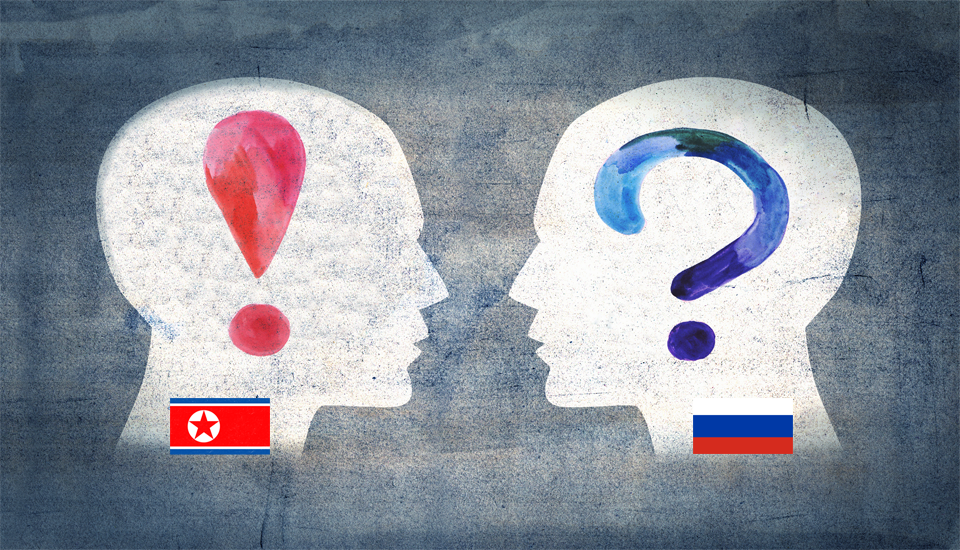
Russia’s Stance on the North Korean Narrative of a New Cold War
Seho Jang | 23.March.2023
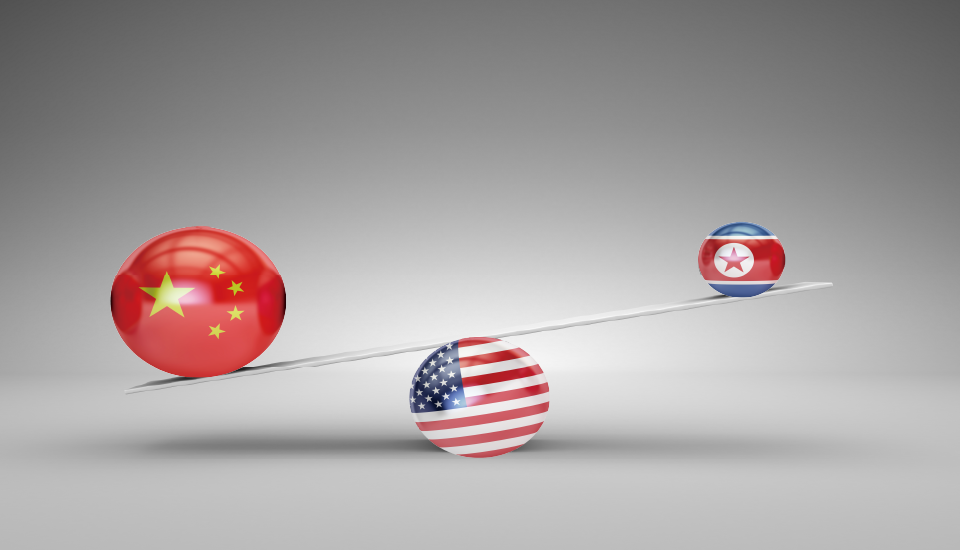
U.S. Stance on North Korea’s “New Cold War” Narrative
Hyun-wook Kim | 21.March.2023
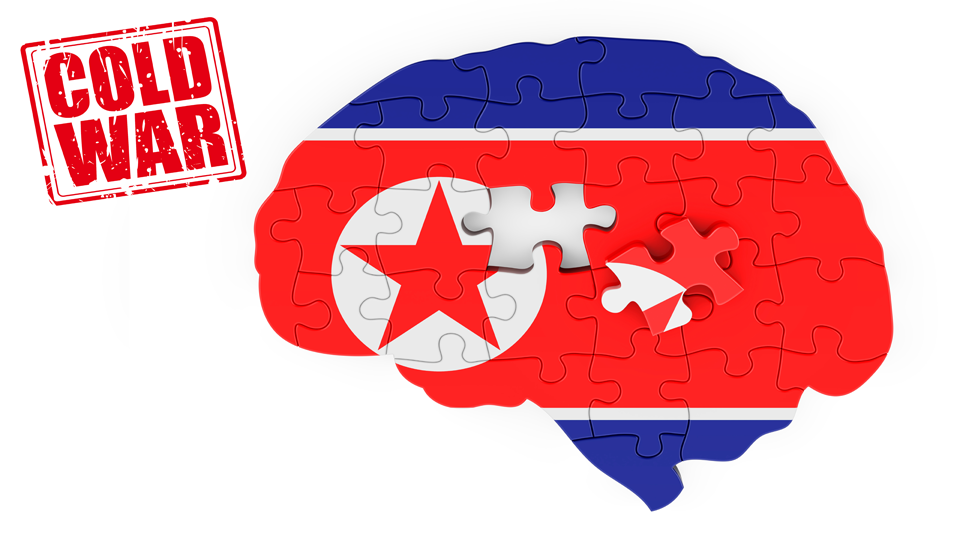
North Korea’s Outlook on the New Cold War
Won Gon Park | 09.March.2023
LIST